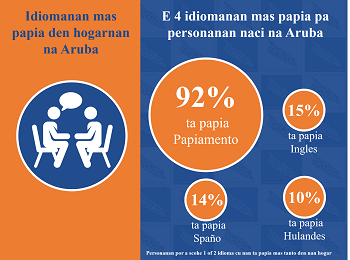(Oranjestad)—Multilingualism is an essential factor of communication between the public and a multilateral diplomatic facilitator; something extremely important for the United Nations who favors dialogue, tolerance and understanding. Multilingualism ensures effective participation and mayor transparency with efficiency in better results.
On February 21st, the world celebrated International Mother Language Day. For this day, Unesco celebrates each year with a different theme as to highlight the importance of a mother tongue within communities.
According to the organization, 40% of the world’s population does not receive an education in a language they speak and understand. Nevertheless, thanks to the efforts made for the importance of mother languages, progress is being made in terms of multilingual education, especially for children. Furthermore, the commitment to further develop multilingualism in the public sector is becoming more popular.
Language and multilingualism can promote inclusion. This correlates with one of the Sustainable Development Goals from the UN, which states that no one must be left behind. Unesco promotes multilingual education based on mother languages. This is a type of education that begins in the native tongue of the student. Later, other languages are gradually introduced. This method ensures that students can fill the gap that foreign languages may leave behind in the home. Students would be able to discover the school’s atmosphere in a familiar language and therefore learn better.
It is for this reason that Unesco calls on other countries to apply an multilingual education policy. The global database on Inequality in Education shows that on a global scale, children who learn their mother language at home are 30% more likely to understand what they read at the end of their primary education compared to those who do not use their mother language as the language of instruction.
Audrey Azoulay, general director at Unesco points out that “to help fight the current crisis of misunderstanding, diversity in linguistics must also be preserved, because this is an essential cultural aspect. Unesco are asking governments to adopt plurilingual education based on mother languages for the first few years a child’s educational career. We know it works; there is empirical evidence that shows that this does indeed help kids learn better.”
Multilingualism contributes to the development of inclusive societies, which allow different cultures to exist side by side. The theme for this year’s International Mother Language Day is “Multilingual Education, a necessity for transforming education” and this adheres to the recommendations made during the Transforming Education Summit, where education for and languages of indigenous populations were highlighted.
Unesco also believes in the importance of cultural and linguistic diversity for sustainable societies. In regards to its mandate to promote peace, the organization works to preserve cultural and language differences, which can lead to tolerance and respect for each other.
The multilingual and multicultural society exists because of their languages, which is transmits and preserve awareness and cultural tradition in a sustainable way. On average, a language goes extinct every 2 weeks, taking with it the cultural and intellectual patrimony.
The idea to celebrate International Mother Language Day was started by Bangladesh in 1999 during the Unesco General Conference. By the year 2000, this day was celebrated around the world.
For this day, Unesco also reminds the world the importance of preserving indigenous languages. At least 40% of over 6700 languages that are spoken around the world are at risk of extinction, because of the lack of preservation.
For this reason, Unesco leads the project called The Decade of Indigenous Languages 2022-2032, which includes an 10-year-long initiative to garner attention around the world on the loss of indigenous languages and the urgency to preserve, revitalize and celebrate them.
On Aruba, for example, the Papiamento language is very valuable. It has been noted a few times that people within the community underestimate the value of the language, especially when a young person moves to a foreign country to pursue a higher education for which they will no longer speak their native tongue.
However, one cannot deny their native language; one will always think in their native tongue. This is why it is very important that the language is celebrated and preserved, so that we can promote, respect and take our language with us everywhere we go.
Aruba is a small island and its dependence on tourism is very important. This is a perfect opportunity to promote Papiamento to foreign visitors, so that they may appreciate the richness and complexity of the language.
According to the Central Bureau for Statistics Aruba (CBS) in preparations for Census 2020, they have organized a prototypical Census survey in 2019, where they discovered that Papiamento is the dominant language on the island, followed by Spanish, English and lastly Dutch.
Aruba should be thankful to the pioneers that have maintained their mission to preserve Papiamento where many people say that the language disturbs the children’s education. Seeing as Papiamento is considered an official language nowadays, we must value this as a symbol of the Aruban identity.

















